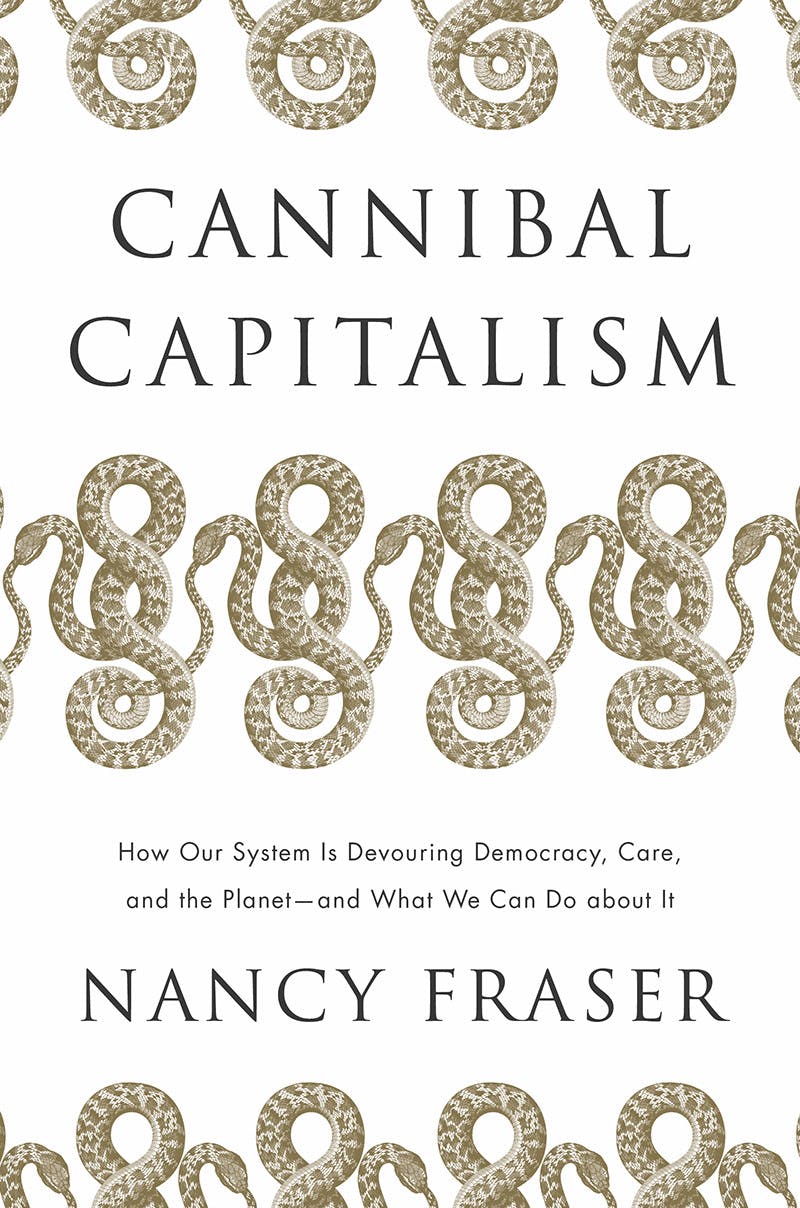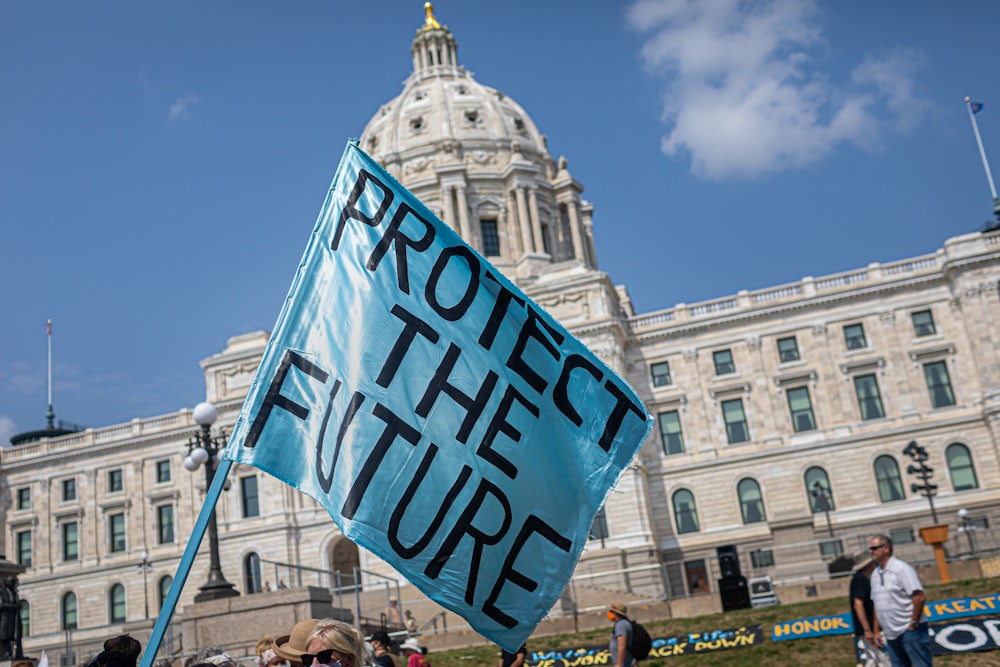Shortly after the United States recorded one million deaths from Covid-19, Biden’s press secretary, Karine Jean-Pierre, made a jarring remark: “We are stronger economically than we have been in history.” From a business perspective, she wasn’t wrong. Over the past two years, billionaires have more than doubled their wealth. The economy grew faster than it has in decades.
Meanwhile, mortality rates mounted among disproportionately low-wage workers of color, as conversations about their “essential work” trailed off. A majority of Americans now believe our democracy is in “crisis,” and a growing number of people can’t afford basic necessities like food and rent, as wages struggle to keep pace with inflation. In her new book, Cannibal Capitalism: How Our System Is Devouring Democracy, Care, and the Planet—and What We Can Do About It, Marxist feminist scholar Nancy Fraser argues that capital’s insatiable appetite for profit came to a head in 2020, as decades of political, social, and environmental crises converged.

I recently spoke with Fraser about those crises and the conditions that have led to them. During our conversation, which has been edited for length and clarity, we discussed women’s work, a loss of faith in our institutions, why capitalism should be understood as a social order, and what might come next.
Indigo Olivier: Your book is called Cannibal Capitalism. Where does that term come from?
Nancy Fraser: Cannibalism is a metaphor with a somewhat problematic history. It has a long racist history, in fact. It’s applied by European colonialists to the people they’re subjugating and conquering. It’s a term of abuse, almost. I’m trying to turn it around here and say that it’s actually those who dedicate themselves to accumulating capital that are the real cannibals.
I.O.: In the system you write about, what is being cannibalized?
N.F.: Capitalism is not just an economic system, in which the owners of property exploit workers in factories, all within the economic realm. It’s also about the relation between what we think of as the economic realm and a whole set of other institutions and societal arenas that are defined in this society as outside the economy but that are the necessary supports for the economy. So it’s the families who nurture and cultivate and socialize and, in general, reproduce the personnel for the economy.
Political systems are another necessary support: the infrastructure, public goods, legal systems, repressive forces. You don’t have capital accumulation without all that in the background, propping it up and enabling it to happen.
However, the very economic processes that depend on those background conditions are also hardwired to trash them. They are hardwired to cannibalize them, to help themselves in an orgy of bingeing: grab whatever they want with no responsibility to replenish or repair what they take, what they damage.
I.O.: You’ve written particularly about how we’re facing a crisis in “social reproduction”—that the interactions that “produce and sustain human beings and social bonds” take place under an untenable strain. Where do we see this crisis playing out?
N.F.: In some cases, you’re talking about people who can’t generate, through paid work, enough income to support a household under current conditions and who are moonlighting, cobbling together, running from one job to [an]other, lots of little jobs, and don’t have the wherewithal to actually perform the care work in the hours allotted that they would need if they’re raising children, dealing with sick or disabled family members, aging parents. Or just keeping friendships and networks in order.
This is partly an issue of time crunch. One important factor here is that we’re living in a kind of capitalism—a historically specific form of capitalism—this thing called neoliberalism, financialized capitalism, globalized capitalism. This is a regime that, unlike previous forms, has been extremely hungry for women’s wage labor, including women with young children. They’re massively recruited into the workforce and even, you could say, pushed into the workforce. In some cases, voluntarily, happily so. In other cases, kicking and screaming and wanting to resist. Those dynamics that have massively increased female labor-force participation all over the globe coincide exactly with other massive pressures on states at every level—national, local, state level—to disinvest in public care infrastructure. Now that’s really a perfect storm. You’re gobbling up the time and energy of those who are primarily responsible for care work, the women, at just the moment when you’re removing or diminishing the public supports in the form of social welfare arrangements.
Then you add debt to that. Subprime mortgages and maxed-out credit cards and car loans, and so on, so forth. More and more of the income that might be devoted to building a kind of care infrastructure is being siphoned off toward the banks and credit industry. That is another form of cannibalization. Our energies—our capacities for precisely that care work that is essential for ongoing civilized society—are being cannibalized.
I.O.: Part of social reproduction is the production of shared meaning within groups, communities, and societies. How do you see the absence of shared meaning played out in the U.S. political landscape?
N.F.: I don’t want to create a deterministic picture, but every social system depends on what Antonio Gramsci calls “hegemony”: some sort of shared common sense. It’s not perfectly shared. There’s lots of dissent, but the dissent stays marginal. It doesn’t accumulate. Enough things can be treated as morally settled so they don’t need to be argued about every second. The things that you do argue about are argued against the background of semi-agreement. That’s the normal situation. Every social order, especially a social order premised on domination, injustice, oppression, more or less works because of that shared common sense.
When you have a real societal crisis of the kind that we have now, it’s really for the most part only a matter of time before that common sense starts unraveling and breaking up. That shared framing, that shared reservoir of underlying agreement against which disagreement can be prosecuted, that tends to break up. People begin to look for out-of-the-box solutions. They lose faith in the established elites, political parties, narratives and frames. They begin to look for something else. They defect. That’s a crisis of hegemony, and it’s a very two-sided thing because, on the one hand, it opens up the possibility for potentially emancipatory alternatives—which is why we are seeing today so many interesting and promising developments on the left like the rise of Jacobin magazine and the whole media ecosystem around it. The growth of [Democratic Socialists of America], the uptake that [Bernie] Sanders got in his two presidential campaigns. You wouldn’t have expected this if the sort of hegemonic controls were more or less intact.
That’s the potentially positive side, but you also get MAGA, Trumpism, anti-vaxism, the whole mess of open scapegoating. Part of what this polarization is is the emergence of competing narratives, which are fighting each other for what will be the new hegemony. What will replace the neoliberal common sense that all we need are freer markets and less state interference? You get these attempts to construct alternatives, and it’s a wild scene. The public sphere, the public discourse—there’s a wilding of it, which happens whenever there’s a crisis of hegemony.
I.O.: How long do you think this situation can continue? Socialists have long argued that capitalism is “digging its own grave,” but as you point out in the book, each time we’ve experienced what seems to be a terminal crisis, capitalism has been able to reinvent itself.
N.F.: Climate change seems to possibly pose a challenge because it seems to represent an objective limit. You let the planetary temperature rise another few degrees, and everything changes. Life becomes literally impossible for more and more populations. It’s very hard to finesse this.
On the other hand, people living
through this kind of general crisis really can’t know. We cannot know for sure
whether the outcome will be the destruction of life as we know it, a new form
of capitalism, a better form, worse form, a new form of postcapitalism. And we
don’t know what tricks up their sleeves the partisans of capital have at their
disposal.
We could have an almost agnostic approach. We could say that we need to reduce greenhouse gas emissions by x percent by year x. We could say that we have to do it in a way that doesn’t offload the burdens and costs unjustly onto some populations so that others can weather it more easily.
And we can say to everybody who wants to do this, let’s all work together. Now we’ll see whether it can be done. And whether, when it is done—if it’s done—the social order that emerges is one that still deserves the name capitalist or not. When does something stop being capitalist? When you tax profits at 95 percent? Is it still capitalism when you introduce much more robust and weighty forms of social planning but still have some private property rights? Is that still capitalist?






